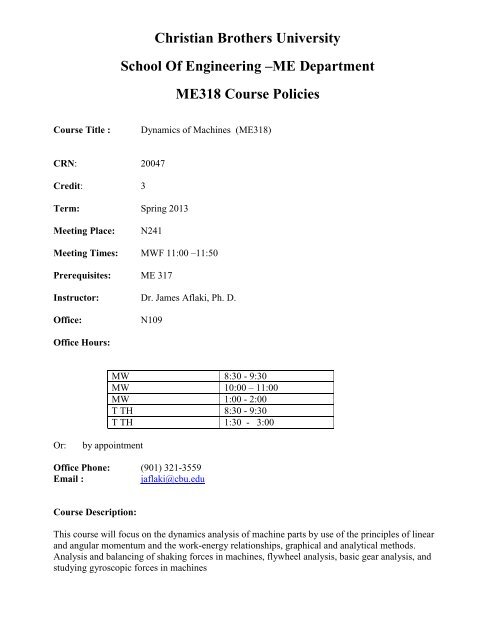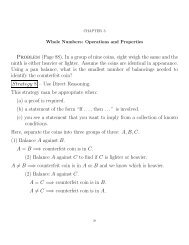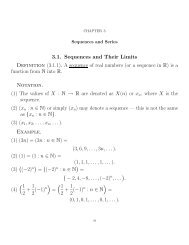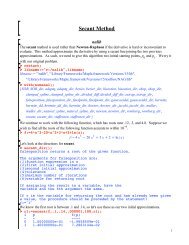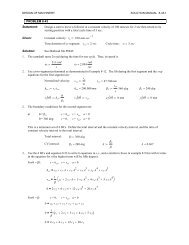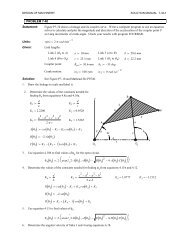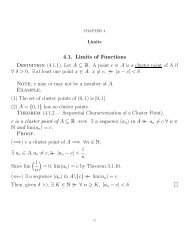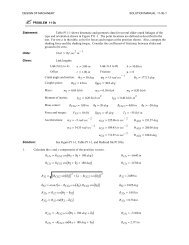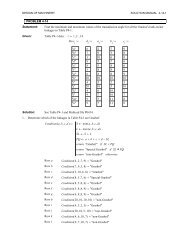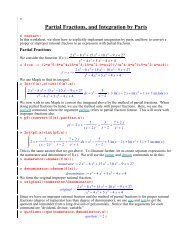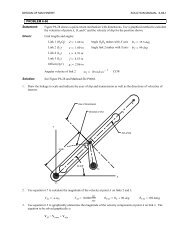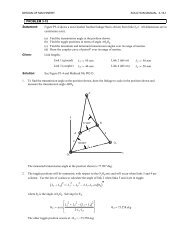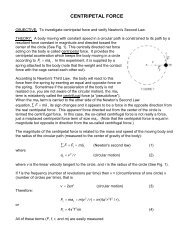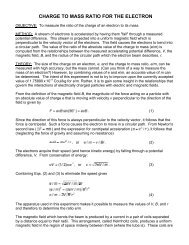ME 318 Dynamics of Machines - CBU - Christian Brothers University
ME 318 Dynamics of Machines - CBU - Christian Brothers University
ME 318 Dynamics of Machines - CBU - Christian Brothers University
You also want an ePaper? Increase the reach of your titles
YUMPU automatically turns print PDFs into web optimized ePapers that Google loves.
<strong>Christian</strong> <strong>Brothers</strong> <strong>University</strong>School Of Engineering –<strong>ME</strong> Department<strong>ME</strong><strong>318</strong> Course PoliciesCourse Title :<strong>Dynamics</strong> <strong>of</strong> <strong>Machines</strong> (<strong>ME</strong><strong>318</strong>)CRN: 20047Credit: 3Term: Spring 2013Meeting Place:N241Meeting Times: MWF 11:00 –11:50Prerequisites: <strong>ME</strong> 317Instructor: Dr. James Aflaki, Ph. D.Office:N109Office Hours:MW 8:30 - 9:30MW 10:00 – 11:00MW 1:00 - 2:00T TH 8:30 - 9:30T TH 1:30 - 3:00Or:by appointmentOffice Phone: (901) 321-3559Email :jaflaki@cbu.eduCourse Description:This course will focus on the dynamics analysis <strong>of</strong> machine parts by use <strong>of</strong> the principles <strong>of</strong> linearand angular momentum and the work-energy relationships, graphical and analytical methods.Analysis and balancing <strong>of</strong> shaking forces in machines, flywheel analysis, basic gear analysis, andstudying gyroscopic forces in machines
Course Objectives1. Deepen understanding <strong>of</strong> dynamical analysis as an essential element <strong>of</strong> the design process2. Develop mastery <strong>of</strong> analytical, graphical, and numerical methods for calculating dynamics<strong>of</strong> machine elements3. Develop understanding <strong>of</strong> vibration and its impact on engineering design4. Develop understanding <strong>of</strong> dynamic balancing, flywheel analysis, gyroscopic forces andmoments5. Relate static analysis to dynamic analysis as applied to machineryInstructor's Educational Philosophy:Education is helping students achieve their goals. Through education, students recognize andimprove their learning skills and strengthen their capabilities to accomplish their life dreams.Each student must be treated uniquely and a mutual respect must be developed between a studentand an instructor. This is paramount in creating a suitable and pleasant learning environment.Methods <strong>of</strong> Instruction:The concepts covered in this course will be presented in a traditional lecture environment as well asusing Power Point slides in combination with videos. Sample problems will be solved todemonstrate applications <strong>of</strong> the theories and concepts covered in the course.Text:Design <strong>of</strong> Machinery (with DVD)- An Introduction to the Synthesis and Analysis <strong>of</strong>Mechanisms and <strong>Machines</strong>, Fifth Edition, Robert L. NortonPublisher:McGraw-HillISBN: 9780077421717Grading PoliciesYour final grade will be determined based on the following table and your class participation.Feedback to students is provided through test scores administered in class as well as consultationwith the instructor if that is required.ExaminationsHomework 5%Pop quiz 10 % (No makeup quiz)Exam 1 20%Exam 2 20%Exam 3 20%Final Exam 25% (Final exam is comprehensive)
Exam dates:Exam 1 January 30, 2013Exam 2 February 27, 2013Exam 3 April 10, 2013Final ExamWill be announcedNo makeup exam will be given. In case you have to miss an exam, you mustinform the instructor prior to the exam time. If it is determined that you have alegitimate excuse, the average grade <strong>of</strong> the first exam that you have taken andthe final exam will be substituted for your exam grade. Missing the final examwill result in failing the course.Grading Scale: A 90-100 B 80-89C 70-79 D 60-69 F 0-59Bathroom Break:Students cannot leave the classroom for using bathrooms during exams. If there is a justifiedmedical case, student must discuss it with the instructor prior to exam.Homework:Homework is assigned regularly.Students must try to solve all problems and submit them on the due date.Late homework submission will result in 30% penalty for each class session after the duedateClass Participation:Students are expected to be called to front <strong>of</strong> the class to discussassigned problems, quiz problems or exam problems.Attendance:Students are expected to attend all classes and actively participate inclass discussions.Any student who misses a total <strong>of</strong> eight hours <strong>of</strong> class time will begiven an F grade for the course.Some <strong>of</strong> the topics presented in class may not be in your textbook.You are responsible for knowing these topics.
Cheating and PlagiarismStudents must always do their own work. Cheating <strong>of</strong> any kind will result in a reduction <strong>of</strong>student’s final grade by one letter grade. Cheating on an exam will result in an "F" grade for thecourse.Computer UsageDuring class time, students can only use computers to do the assigned in-class or homeworkprojects. Students cannot use the computer for any other purposes. This includes, but is not limited tochecking email, browsing the Internet, playing games or printing lecture notes or using the <strong>CBU</strong>intranet, etc. A student who violates this policy will be asked to leave the classroom. A repeat <strong>of</strong> asimilar situation will reduce the student’s final grade by a letter grade.Computer AccountA computer account on the <strong>CBU</strong> Server is necessary. Make sure you have obtained your accountname and password and that you can log in successfully.Students must check their campus e-mail regularly and are responsible for announcements ormemos sent by the instructor via campus e-mail.Electronic Devices:All electronic devices must be turned <strong>of</strong>f during the entire class period.The one and only electronic device allowed to be used in classroom is a calculator.Any other portable electronic devices must be turned <strong>of</strong>f prior to the start <strong>of</strong> each class.Academic MisconductAcademic misconduct is a violation <strong>of</strong> the principles <strong>of</strong> the academic community and will not betolerated at <strong>Christian</strong> <strong>Brothers</strong> <strong>University</strong>. The procedures outlined in Students’ Handbook underAcademic Misconduct will be enforced.Academic misconduct is any conduct which distracts from the teaching and learning process <strong>of</strong>faculty members and students. This includes, but is not limited to: inappropriate or abusivelanguage, distracting or disorderly conduct, misuse <strong>of</strong> or damage to property, or conduct dangerousto others.American Disability Act:It is the policy <strong>of</strong> <strong>Christian</strong> <strong>Brothers</strong> <strong>University</strong> to provide reasonableaccommodations to qualified students with disabilities. Please seeyour instructor for proper procedures and arrangements.
Topics:1. Static force analysis2. Dynamic force analysis3. Balancing rotating masses4. Balancing reciprocating masses5. Flywheels; gyroscopic effects6. Critical whirling speeds7. Torsional vibration <strong>of</strong> shafts


